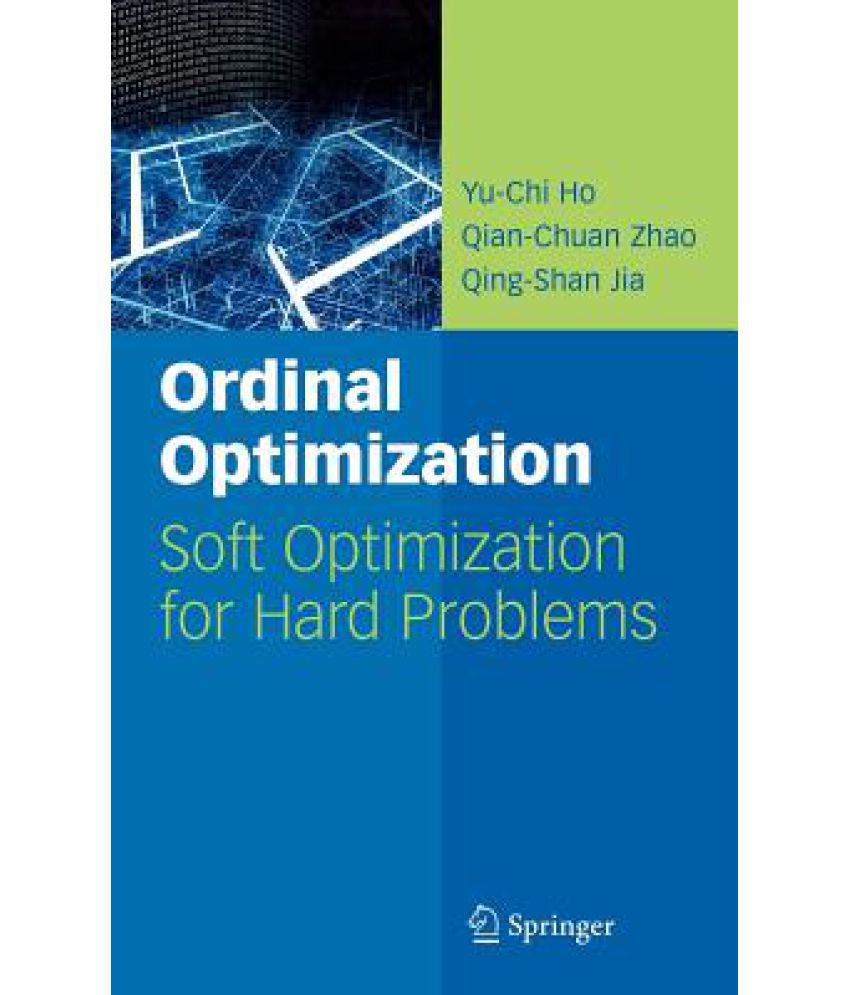Something went wrong. Please refresh the page and try again.
Something went wrong. Please refresh the page and try again.
Notifications can be turned off anytime from settings.
Item(s) Added To cart
Qty.
Something went wrong. Please refresh the page and try again.
Something went wrong. Please refresh the page and try again.
Exchange offer not applicable. New product price is lower than exchange product price
Please check the updated No Cost EMI details on the payment page
Exchange offer is not applicable with this product
Exchange Offer cannot be clubbed with Bajaj Finserv for this product
Product price & seller has been updated as per Bajaj Finserv EMI option
Please apply exchange offer again
Your item has been added to Shortlist.
View AllYour Item has been added to Shopping List
View AllSorry! Ordinal Optimization: Soft Optimization for Hard Problems is sold out.


You will be notified when this product will be in stock
On the Back Cover
Performance evaluation of increasingly complex human-made systems requires the use of simulation models. However, these systems are difficult to describe and capture by succint mathematical models. The purpose of this book is to address the difficulties of the optimization of complex systems via simulation models or other computation-intensive models involving possible stochastic effects and discrete choices. This book establishes distinct advantages of the "softer" ordinal approach for search-based type problems, analyzes its general properties, and shows the many orders of magnitude improvement in computational efficiency that is possible.
About the Author
Yu-Chi Ho (lead author) is the only author whose book in the system/control field has the distinction of being a SCI Citation Classic* as the most referenced book on the subject. After 37 years, his book is still selling about 500 copies per year without a revision.
Applied Optimal Control (with A.E. Bryson Jr.); Hemisphere-Wiley 1975, first published by Xerox College Publishing 1969.
*Citation Classic, SCIENCE CITATION INDEX (CURRENT CONTENTS) 2/25/80, Vol. 11, No. 8, as the most cited reference on the subject.
Dr. Ho is the founding editor of the international journal, Discrete Event Dynamic Systems. He is the recipient of various fellowships and awards including the Guggenheim (1970), the IEEE Field Award for Control Engineering and Science (1989), the Chiang Technology Achievement Award (1993), the American Automatic Control Council Bellman Control Heritage Award (1999), the ASME Rufus Oldenburger Award (1999), and the Isaacs Award from the International Society of Dynamic Games (2004). Dr. Ho is an IEEE Life Fellow and an INFORMS Inaugural Fellow (elected 2002), a Distinguished Member of the IEEE Control Systems Society, a member of the U.S. National Academy of Engineering and a foreign member of the Chinese Academy of Engineering and the Chinese Academy of Sciences.
In addition to serving on various governmental and industrial panels, and professional society administrative bodies, Dr. Ho was the President of the IEEE Robotics & Automation Society in 1988.
About the Book
Our civilization employs increasingly complex human-made systems, such as large-scale electric power grids, air traffic control systems, manufacturing plants and supply chains, the Internet and other communication networks. Performance evaluation of these systems is accomplished by using simulation models rather than experiment with the real systems. However, these systems operate and evolve in time via human-made rules of operation which are difficult to describe and capture by succinct mathematical models. And while simulation models are often used for design validation and other purposes, computational constraints and the changing nature of the problem domain make them unsuitable for optimization purposes.
If we accept the need for search based methods as a complement to the more established analytical techniques, then quickly narrowing the search for optimum performance (ordinal optimization) is more important than accurately estimating the values of system performance during the process of optimization (cardinal optimization). The purpose of this book is to address the difficulties of simulation optimization problems the optimization of complex systems via simulation models or other computation-intensive models involving possible stochastic effects and discrete choices. This book will establish the distinct advantages of the "softer" ordinal approach for search-based type problems, analyze some of its general properties, and show the many orders of magnitude improvement in computational efficiency that is possible. As such, the book is complementary to existing optimization literature. The tools described here do not replace but can be used separately or in conjunction with other methodological tools of optimization."
The images represent actual product though color of the image and product may slightly differ.
Register now to get updates on promotions and
coupons. Or Download App